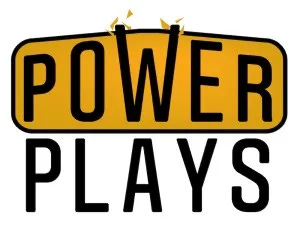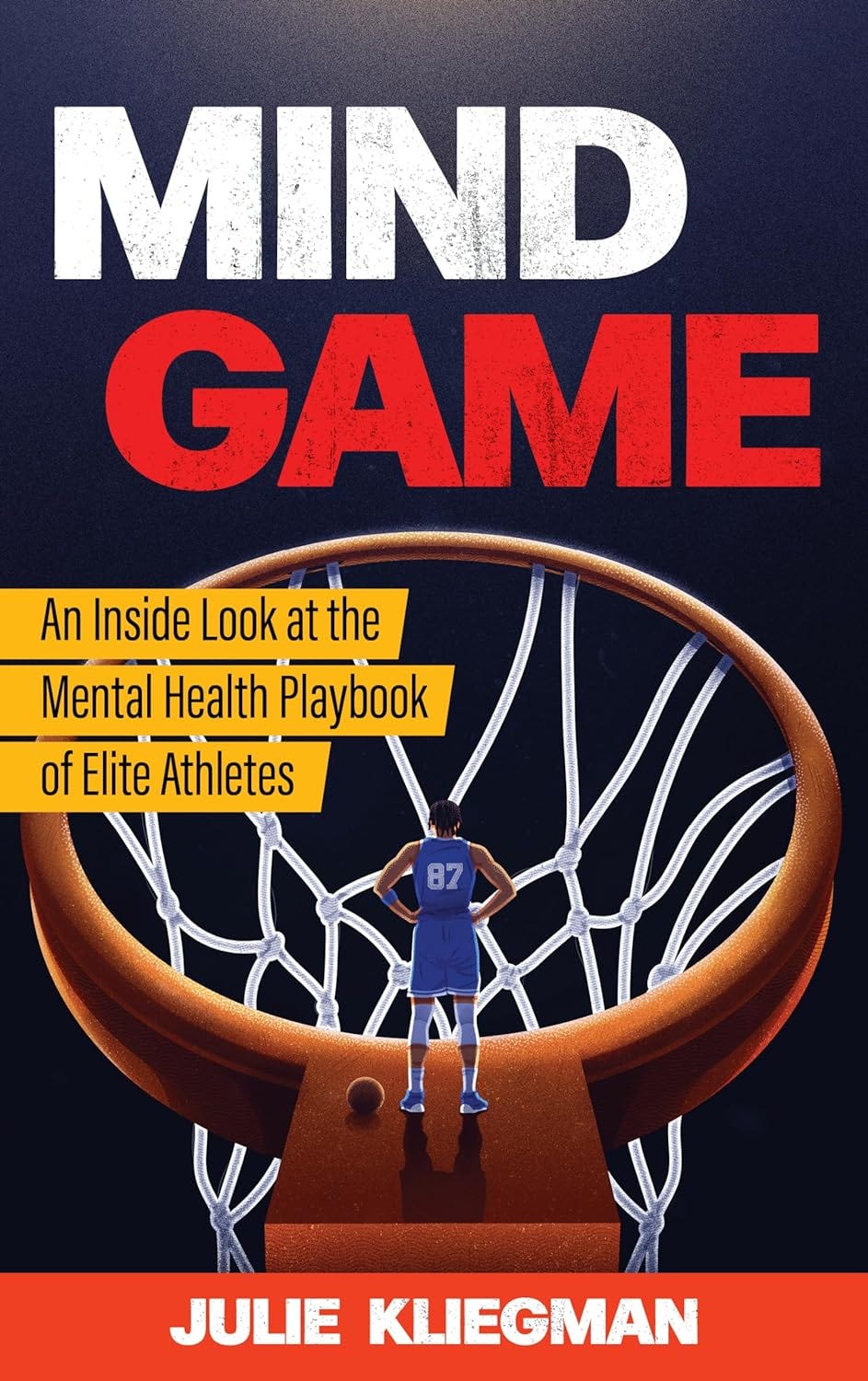A candid conversation about mental illness in sports
A Q&A with author Julie Kliegman about her new book, "Mind Game: An Inside Look at the Mental Health Playbook of Elite Athletes."
Hi! I hope your weekend is going well. I am so excited today to bring you a conversation with one of my favorite humans, Julie Kliegman, about her new book, “Mind Game: An Inside Look at the Mental Health Playbook of Elite Athletes.”
“Mind Game” is a must-read book that dives deep into the relationship between athletes, mental health, and mental illness, tying in science and history with interviews with some of the biggest names in sports, to paint a complex, nuanced, and deeply informative portrait of the issue.
Last month, Kliegman and I spoke about our own mental illnesses, how we’d like to see the narratives around athletes and mental illness evolve, the unique mental health challenges facing athletes in women’s sports, the myth of “mental toughness,” and so much more. I know you’re really going to love this one as much as I loved reading her book and talking with her about it.
Okay, friends. Let’s do this.
Power Plays: I will start by saying that I personally have depression, anxiety and ADHD. Managing my mental illness is a big part of my life, and it's been very up and down, especially in the past few years over the pandemic. I was both excited and a little scared to read your book, because I never know quite how my brain is gonna process reading about mental health. So my first question is, how are you taking care of your mental health throughout the book launch?
Julie Kliegman: It's been a challenge for sure. I'm bipolar and over the past few years, while I've felt like I've had a pretty good handle on it, it's still a situation where writing a book all about mental health does feel at times like it's kind of like poking at your sore spots, for lack of a better way to frame that. But yeah, I mean, taking care of myself has been really hard throughout this process, because I wrote this book on top of a full-time job, and you have so little downtime. But I think really leaning on my friends has helped a lot. And my cat, of course.
PP: Thank God for pets. Don't know what we’d without them. What made you want to write this book at this time? Obviously, I've been following your journalism for a while. I know this is a topic that has interested you, and you shared in the book about your journey with sports and mental illness. But why now, and why this particular framing?
JK: I think the pandemic is a good thing to point to for the “why now.” Because a lot of people who had never experienced mental health issues or mental illness before the pandemic have experienced it in the past few years, and it's never felt like mental illness is more broadly applicable than it is right now, unfortunately. But that also means that people are in a place where they're more able to relate to others going through stuff like this.
PP: We've gotten to the point where we are now lauding and almost, like, hero-worshiping athletes who do come forward and speak about mental illness. The word “brave” is used a lot. But I still feel like we are looking for narratives that have a beginning, middle and end when talking about mental illness, and the truth is, as someone who deals with it chronically, the reality is much messier than that. There is a quote in your intro that I highlighted which said that managing mental health is about “the difficulty of the slog, of surviving on a daily basis.” In what way would you like to see the narrative change as far as how we talk about mental illness?
JK: We definitely need to do less of the hero-worship stuff, because I don't think that helps anybody. It doesn't help these athletes who are trying to say that they're imperfect, for us to then be like, “Oh, my God, you're so perfect.” I mean, it just doesn't make sense. And so I would like us to — because we're journalists, I feel like I'll address it from that point of view — I would like us to write stories that pick up on trends instead of just all these (often great) one-off stories about one athlete's struggles. I would also like us to put more context into articles about how many people are experiencing stuff like this, and what the unique systemic pressures are on athletes in particular, because I think that's something that is misunderstood a lot of times. People think, “Everyone deals with mental illness. What makes athletes so special?”

PP: On that note, why do you think people are so moved and captivated when athletes like DeMar DeRozan or Naomi Osaka open up about mental health struggles?
JK: I think part of it is that everyone has some connection to sports, it's just such an ubiquitous part of our pop culture. And these are people we look up to — whether or not we should is another question. But I think when someone on that level speaks out, I think it is really powerful.
PP: We also associate athletic success so much with mental toughness, and there is still a narrative or a myth, and I’m even guilty of buying into it at times, that mental illness is the opposite of mental toughness.
JK: "Mental toughness" is this extremely popular and very misunderstood term. It has a real meaning that researchers sometimes agree on, but in the hands of the public and pundits and journalists, it just gets completely twisted into, like you said, being almost the opposite of mental illness. I think the reality is that someone like DeRozan or Osaka who are coming forward with these issues, they are mentally tough to be able to withstand the pressures of disclosing those illnesses.
PP: Where do you see women's sports fitting into all this? Mental illness, as we know, affects men and women and nonbinary people, everybody in the gender spectrum. But I'm wondering if there's anything that you found in your research that was specific or unique to the way that mental illness affects women athletes?
JK: I think women athletes occupy a really interesting space in that regard, because they don't face some of the stereotypes that men do, at least to the same extent, because people expect women to be “emotional.” So in some ways there's a lower barrier to entry for women to disclose that they have mental illness or that they're struggling with something. But at the same time, these women's leagues, as you know very well, have so many fewer resources than the men's leagues do. That's on a league level, it's on a team level, and it's on an individual level, because they make less money and there are fewer professional opportunities to begin with. And so yeah, they might be more open about their struggles, at least anecdotally, but that doesn't mean they have access to the professionals they need.
PP: A common theme in women's sports, especially in the past couple of decades as they’ve started to professionalize, has been that anything negative has to be buried because you coming forward with your problem could threaten the existence of this very fragile thing that we're trying to get off the ground. And also there’s this added pressure because every time you play you're basically representing your entire gender and the validity of your gender in this space. Every bad game takes on outsized meaning, every missed shot is a referendum. I always wonder how much that pressure takes a toll on the mental health of women athletes.
JK: I think it totally does, at least in my experience talking to them. Like Layshia Clarendon for example, wrote the foreword to my book, and they're not a woman, but they play in a women's league, the WNBA. And I feel like part of their mental health struggle is just all the weight the social justice aspects of their advocacy put on themselves. Because female athletes and athletes in women's leagues, whether they're female or not, face all this pressure to represent so much more than themselves and be like the perfect role models. I think that absolutely takes a toll on your mental health.
PP: Another thought I kept coming back to while reading your book— and this is something that someone said to me in some of my ADHD coaching work, it's not like a revolutionary concept or anything — is that sometimes success can feel really shitty. I know in my job I experience this in much less consequential ways. If I publish an article that goes viral, I want to go hide because all the attention is just overwhelming and it doesn't feel right. I want to sabotage it. You hear so many stories about athletes who reach the peak, win that gold medal, get their career-best result, win that championship, and the peace that maybe they thought would come with that achievement doesn't exist. Is that something that you came across in your reporting?
JK: Absolutely, and I think probably the first person to document this super well was Michael Phelps. Because he obviously encountered all this success, he's one of the most successful athletes of all time, and yet after basically every Olympic cycle, he feels super depressed afterward. And I came across it in my reporting again and again. Stephanie Labbé, the former goalkeeper for the Canadian national soccer team, she told me a story similar to Michael's. After Canada won gold in the Olympics she didn't even want to look at her medal or celebrate for like weeks afterward. It just becomes this whole thing where it's like, “Well, I did this cool thing, but now what?”
PP: Where would you like to see the conversation go now, and maybe even more so than the conversation, what actions would you like to see taken?
JK: In terms of the conversation, I think focus on elite athletes is good, and obviously where I started out. But I also think it's really important to look at what we're doing with athletes on the youth level. Those kids and their parents often don't have the resources for mental health professionals, or the time, frankly. You know, we can’t make every adult free of mental illness, that's ridiculous. But if we give kids in sports the tools to start developing good habits, I think that can only help. And then in terms of actions, I find this question kind-of tough, because I can't invent a perfect solution out of nowhere. But I think just like giving people access to more money, humanizing them in the media, and just letting them steer the ship in terms of what they think they need and listening to that is really important.





